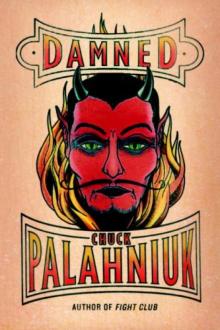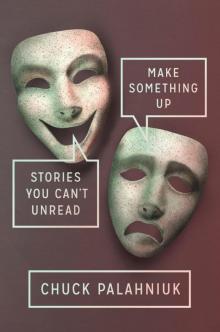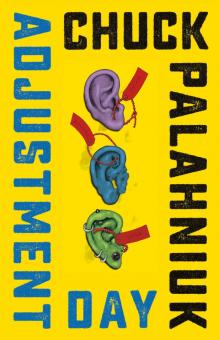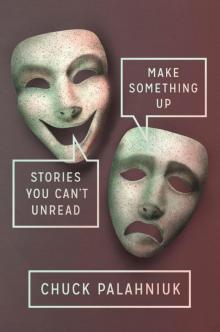- Home
- Chuck Palahniuk
The Invention of Sound Page 3
The Invention of Sound Read online
Page 3
Schlo plucked out an earbud. Bumped his cup and sloshed coffee. Snatched a napkin from the dispenser and mopped the table. He ripped out the other earbud and flung them both at her. Pushing himself away from the table, he shoved, red faced, past the waitress. As his parting shot, he muttered, “You should maybe see a priest.”
Mitzi gathered the fallen earbuds, calling after him, “My work is its own church.”
The server watched him exit through the glass doors and stagger across the parking lot toward his Porsche. She said, “I love his films.” A waitress playing an actress playing a waitress.
Mitzi looked her up and down. She nodded after the Porsche. “You want to be in his next release?”
The girl asked, “You a producer?” She looked to be twenty-three, twenty-four, with just a trace of corn-fed twang to her words. She hadn’t been in the Southland long enough to fry her skin and hair. No wedding ring, either. Promising details.
Mitzi looked at her nametag. “Shania? You know what a Foley artist is?”
She shook her head, Nuh-uh. “But you know people, right?”
In response Mitzi lifted the packet from the table and fished out a thick bundle of bills. She thumbed off one, two, three hundred and held them up, waiting to see whether or not this new talent would take the bait.
Robb called him at home. To check in, he said. He asked if Foster would be at the group for their next meet-up.
Foster studied the bite mark on his hand. The small horseshoe of baby teeth, scabbed over in fresh blood. And he told Robb to look for him in the church basement.
Before he could hang up, Robb’s voice barked something, words pent up until this last chance. Foster brought the phone back to his ear and waited for a repeat.
Robb asked, “Why Denver?”
Foster fished his memory for how long he’d known Robb. When they’d met in the group, any details Robb had shared about Robb’s own dead child, an infant, a son, back when Foster had first joined the support group.
Again, Robb asked, “What’s so important in Denver?”
Foster bit back the truth. A monster was in Denver. A chat room avatar had let slip that Paolo Lassiter would be doing a piece of business there. Nobody was anyone on the dark web, but this chat room stranger had called Lassiter a big name in child sex trafficking, and said he’d be stopping over in Colorado for a day, maybe two.
Denver had been a long shot. But Foster had loaded his phone with screen grabs of Lassiter and made a list of the most likely hotels and set off on a fantasy of throttling the kingpin and beating out a confession about Lucinda.
If he told Robb that much, Foster would be needled to confess about his entire descent into chat rooms and galleries, and that would negate all his good intentions.
Instead, Foster said, “I was meeting a girl.” He paused as if he were embarrassed, but actually to cobble together more lies. “I met a girl online. We might, you know, get married.”
By now his luggage would be touching down in Denver. Going around the baggage claim carousel. Maybe even in transit back to him.
The line went quiet. Foster listened for sounds in the background, hints of Robb’s life since his son’s death. There was nothing. His wife had walked out. Robb might’ve been calling from a government bunker, the silence was so thick.
“Don’t lie to us,” said Robb, his voice burning with contempt. “You’re not trying to resolve anything.” Playing some ace, he added, “We know exactly who the girl in Denver is, and you ought to be ashamed of yourself.” And as if to drive home the shame, he lowered his voice and said, “The entire group knows!”
It was Foster’s turn to be stumped and confused, confused and frustrated, frustrated and to hang up the phone.
The past lived on in her hands, the way they’d shaken when Mitzi took her first DAT into a pitch. The memory lived as pain in her scalp, the old tug of her hair. She’d such long hair back then. High school–long hair, she’d pulled it tight, knotting it into a French braid she’d pinned down. Her French braid pinned to the back of her head, pinned as cruelly as any butterfly or scarab beetle pinned to the board in freshman-year Biology of Insects.
Mitzi Ives, schoolgirl Mitzi, she’d suffered the pins as both the board and the bug to be stared at.
Her hairstyle she winced to recall, the way it showcased her neck. The way her neck skin had glowed red when the producer eyeballed her chest and rubbed a hand over the blue stubble of his cheeks and chin.
The way her shoulders curved inward. How Mitzi hunched forward and crossed her arms. Her entire body was a recording of that first sales pitch.
“Miss Ives,” said the producer, not Schlo. He looked at something written on his blotter. “Mitzi.”
He wasn’t Schlo. She’d worried Schlo would recognize the scream. Her career would begin and end with that sit-down. A rival of Schlo’s this had been. He’d nodded for her to take a seat opposite his desk, then he’d sat. Perched he had, on the front edge of his desk, perching himself in her face, so close she could smell the starch in his shirt.
She’d skipped school half a day. Ditched a quiz in Popular American Politics, and missed a session in the language lab and a lecture on Intro to Fractals.
She’d worn her school uniform on the bus, her pleated, plaid tweed skirt. The blouse with capped sleeves and a Peter Pan collar with the top two buttons undone. Her feet remembered the shoes, too-big high heels left behind after her mother had taken a powder.
The chair she sat in was stylishly low, its seat wasn’t a fart off the floor. Low, precisely so her skirt would slip toward her waist. Low so that she’d be forced to lean forward to tug the hem of the skirt and clamp it between her knees. At the same time, bending forward, her collar dipped to where not-Schlo could peer down the front of her blouse. Ordinary clothes. In her bedroom such clothes had been a uniform. Professional Frumpy. Here they felt like a music video striptease. Around her, the usual Berber rugs and chrome lamps. A wall of windows framed a view of Netflix.
At her eye level had been his crotch. Handshake distance.
Here was a tricky moment. In this game she’d never played, Mitzi had brought a tape player loaded with the DAT and cued up. She’d sweetened and fattened the scream, listened and relistened until she’d no idea whether it was any good or not. The player she’d set on the floor at her feet. Her feet still felt the wadded toilet paper she’d crammed into the toes of her too-big high heels.
Not-Schlo, his necktie a pointer, a striped silk arrow, red silk, it pointed down from his face to his crotch. This her eyes couldn’t forget: How he could perch there and look at any point on her face and body. Stare up her skirt. Down her blouse. While she couldn’t look at the one stuffed, crammed-full bulge, the swelling that eclipsed his belt buckle. Like a miniature belly it looked, stuffed like her shoes were stuffed. Between the belly-belly hanging down and that bulge rising up, his belt buckle was almost lost. None of this could she look at.
That was his power.
She brought the tape player to her lap. Like armor she wore it. Like a blocky, heavy, high-tech fig leaf, its speaker was positioned as if the sound would come wailing out of her.
Not-Schlo, he grunted. “What have you brought to interest me, young lady?” His hand went to his mouth and wiped his lips. His throat shifted up and down as he swallowed, hard, making the knot of his tie bob. A shining red-silk Adam’s apple.
Mitzi fumbled the buttons on the player. Tape squealed at high speed past the head. She clicked Rewind and brought the numbers on the counter back. The next appointment waited beyond the door. Voices were already trespassing to pull the focus off of her moment.
Mitzi felt weak. She’d failed. She would always fail.
Her body continued to be the black box of a jetliner that had crashed with no survivors.
She pressed Play.
A hiss of room tone followed. Then, her art.
Not just her hands or her neck but her entire body felt the rush. She was more than he
r body and mind. When the scream played, she felt plugged into the eternal, as if she were channeling something from the next world. She’d created something immortal, worth more than money, a thing no bean counter could create.
This was her power.
The scream rang out, and the shift occurred. The reversal. Now the producer was reduced to being merely a body. His mouth gaped to mimic the sound. That was the hallmark of the best gesture or catchphrase. Like a fishhook, it sank barbs into the audience and became part of them. A parasite, this scream was. The not-Schlo’s eyes bugged even as his belly and crotch shrank away. They bugged and clamped shut as if suffering the same pain her actor had felt. The producer’s mouth yawned, dropping his chin into his neck, and the all of him reared back as if Mitzi had shot or stabbed him. As if she a prizefighter was, and she’d pasted him a roundhouse punch to his glass jaw.
After the tape returned to its dull hiss, the room continued to vibrate. The voices from the waiting room had fallen to silence. Silence until the small words of one distant stranger asked, “What the fuck was that?”
In the office, the producer looked around. The bookshelves weren’t the shelves they’d been. The framed photographs had become something strange. Every pen and book had shifted to become an animal menace in this confusing jungle, and a new host of chemicals appeared to surge through his body, the tears welling in his eyes, the flushed, forked veins that rose out of his buttoned-down collar.
Such a rush Mitzi had felt recording that first scream.
Everyone wanted to have an effect. People spent their lives trying to get a laugh. Or to seduce an audience of strangers. The goal was to commodify something, repeat it, sell them, these the most intimate of human drives. It meant turning people’s basic humanity into something that could be bought and sold. From fast food to porn, this was power.
The producer shook his head until his cheeks flapped. He lurched to his feet and staggered behind his desk to slump into his chair. Even the swivel chair, black leather and button tufted, made a squeak like a beast, like a throat cut, and not-Schlo lifted his hands from the arms of the chair and recoiled into a small ball balanced there.
Mitzi’s body never forgot that feeling. To vault from being a nobody to being the most important person in the room. Prey to predator.
She moved her hand as if to press Play once more, and the producer waved to stop her.
“Don’t,” he begged her. “My heart.”
That, the shift from frightened to frightening.
Before that day, any rude bus driver could make Mitzi cry. Henceforth, her career would be to make everyone else cry. She’d jumped rank to become a professional bully, but better. This was tantric, the way she’d create universal tension, then trigger a united blast of relief. It was sexual, a smidgen more than almost.
Still two years shy of graduation, and she’d never gone back to class. After that day, the high school had sent truancy letters to her father. But from that point she’d been the only Ives in Ives Foley Arts.
Fractals would be for other fifteen-year-old girls to conquer. College-track girls. Mitzi knew all there was to know about life and violent death and cutting deals with back-end points allotted against the international net box office. Mitzi knew what tortures would spoil a scream.
The voices in the outer office remained silent. Now they were listening to her. The producer, not-Schlo, he reached a spotted hand inside his suit coat and brought out a rattling bottle of pills. One of these he tipped into his palm and tossed onto his tongue.
For a while Mitzi had called her work “politics.” To her mind, women had never been allowed to kill. Not unless they were threatened. Women could never kill for the sheer pleasure, and they could never kill another woman. Despite all the fuss about universal child care and income inequality, killing was the real measure of a woman’s progress. As the thrill of that first recording session had ebbed, Mitzi told herself that collecting screams amounted to a political act. It constituted the ultimate power.
To her mind, it amounted to Last Wave Feminism.
Eventually, her motives would evolve. As she continued to chase that first high, Mitzi would come to think of the work as a gift. In classic displacement, she tried to find her joy in others. She was redeeming the anonymous lives of anonymous people, giving them an immortality they’d never dared imagine. Mitzi Ives: Star Maker.
But each new motive was just a step further from the truth. It wasn’t political or benevolent, what Mitzi did she did for power. The ever-diminishing marginal rewards of that first brush with power.
She’d never taken a drink or a pill. Those would come soon, when the stories she told herself had begun to wear thin.
The producer, not-Schlo, he’d gathered his wits. His eyes counted numbers Mitzi couldn’t see, and he said, “I’ll give you twenty thousand for exclusive world rights.”
Mitzi set the DAT player at her feet and crossed her legs. She let her skirt ride up. To see if he’d look, to see if the power had truly shifted to her.
He didn’t look. “Okay, twenty-five,” he’d said.
“Thirty,” Mitzi countered. She leaned forward and allowed her neckline to dip low. To display the almost-legal shape of her breasts.
He continued to not look. She’d proved herself to be someone that dangerous.
A sneer, not a real sneer, more a reflex he’d used on too many pitches in the past, it pulled his mouth to one side. “Nobody’s paid that much for a scream.” He said, “Crazy to think—”
Mitzi stood and smoothed her skirt. “You want to try for forty thousand?” She made as if to take her things and leave.
He snapped. Fear would sell him, the dread that a rival would spend the forty grand and leverage the scream to make a fortune. Such a scream, it could be licensed and sub-licensed to films and television, to video games. Telephone ring tones. Greeting cards! Screams needed no translation to reach foreign markets. The trickle down would never end. It would be a profit engine forever.
“Sit, sit, sit!” he’d said and patted the air as if he could shove her back into that low-low chair. He rummaged through a desk drawer and dug out a checkbook. If he balked, she’d take the recording wide. By next week not-Schlo would be bidding against an army of sound engineers and special effects gurus. Testing a pen, he asked, “What do you call this…masterpiece of yours?”
The question gave Mitzi pause. It was like naming a first child, something so important she’d neglected to give it any thought. According to her watch, the meeting had gone beyond its allotted time. Other pitches would be piling up in the outer office, all those strangers listening. They’d hate her for hogging so much time.
She found she enjoyed being hated.
Here was her brilliant new career: to attract the listening of a billion strangers.
“I call it…,” she said and waited. Timing was everything. “Serial Killer Flayed to Death by Child.” She added, “And let’s round the price up to a hundred thousand dollars, shall we?”
The producer didn’t respond.
The faint sound of his scratching, his pen scratching her name and the number one hundred thousand on a check, that sound would echo forever, recorded in her ears.
No one spoke at first. The group of them sat around the basement, casting looks at each other. A former mother looked at a former father who looked at the group leader. No one looked at Foster. Then they were all looking at the group leader, Robb. Robb looked at Foster and asked, “So, how’s Bali?”
Foster looked down at his hands, at his hands in his lap.
A doctor whose son had gone bicycle riding and forgotten to wear his helmet, just once, just that one time, just a quiet ride around the neighborhood is all it was, a story Foster had heard him recount until Foster could tell it himself, this man took a phone from his coat pocket. The doctor brought up a web page and held it for the group to see. He said, “I understood your daughter was dead?”
People craned their necks to look. Other
s brought up the same page on their own phones. One member said, “So she’s not dead, your Lucinda?”
His brow wrinkled with confusion, another member studied his phone. “A dead girl this most certainly is not.”
The group leader, Robb, held up his hand for silence. To Foster, he said, “I was afraid of something like this.” The picture of empathy, he urged, “Tell us, again, how Lucinda died.” After a beat, he added, “Please.”
There was nothing Foster hadn’t already told. She’d stepped into an elevator.
The group, this group amounted to a kind of addiction treatment. To Foster, they were all recovering from their love for a dead child, and they wanted him to follow the same path, but he couldn’t. He wouldn’t abandon his addiction. And maybe they envied him his denial. Each of them had seen his or her son or daughter removed from life. They’d identified the remains. Held a funeral. Only he had the option to pretend his child still existed, somewhere.
The woman in the photos they perused, she had Lucinda’s fall of wavy auburn hair. College age or thereabouts. The woman smiling beside him at the rail of a cruise ship, her eyes and mouth were the adult version of the eyes and mouth of the second grader smiling beside a much younger Foster in other photos.
Yes, his child, yes, Lucinda, yes, she was dead. This other Lucinda, so beautiful and still alive on her social media page, she was a coping mechanism. Why bother explaining? His reasons would never sink in.
Another member of the group held up a video clip of this full-grown Lucinda and Foster, her father, in the basket of a hot-air balloon. Far below them acres of grapevines flowed in parallel straight lines across a landscape of low hills. This member asked, “Gaslighting us, maybe?”
Another corrected. “‘Trolling’ the young people call it nowadays.”
The group leader continued to press. “If… If she’s really been missing over seven years, you need to finally file with the medical examiner for a Presumption of Death Order.”

 Fight Club
Fight Club Damned
Damned Tell-All
Tell-All Choke
Choke Make Something Up: Stories You Can't Unread
Make Something Up: Stories You Can't Unread Invisible Monsters
Invisible Monsters Phoenix
Phoenix Beautiful You: A Novel
Beautiful You: A Novel Haunted
Haunted Survivor
Survivor Adjustment Day
Adjustment Day Pygmy
Pygmy Doomed
Doomed Lullaby
Lullaby Snuff
Snuff Burnt Tongues
Burnt Tongues The Invention of Sound
The Invention of Sound Stranger Than Fiction (True Stories)
Stranger Than Fiction (True Stories) Rant: The Oral History of Buster Casey
Rant: The Oral History of Buster Casey Make Something Up
Make Something Up Rant: An Oral Biography of Buster Casey
Rant: An Oral Biography of Buster Casey Doomed d-2
Doomed d-2 HOPE AND GORY
HOPE AND GORY Invisible Monsters Remix
Invisible Monsters Remix Beautiful You
Beautiful You Fugatives & Refugees
Fugatives & Refugees